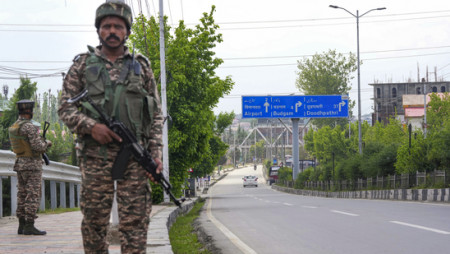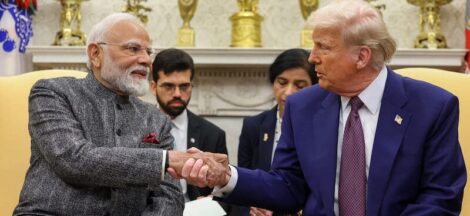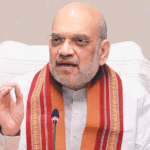By Asad Mirza
The last week saw an unprecedented escalation of tension between two nuclear powers, i.e. Indian and Pakistan. The situation was exacerbated after the launch of Operation Sindoor by India to retaliate against Pakistan-backed terrorist groups, after the Pahalgam attack of 22 April, in which 26 civilians were killed by the operatives of The Resistance Force (TRF) a largely unknown entity.
In a tit for tat manner, after Operation Sindoor carried on the night of May 6-7 by India, Pakistan launched a series of drone attacks and heavy shelling along the Line of Control (LoC) in Kashmir on Wednesday (May 7). The Indian response to this aggression continued the second and third day, too and a ceasefire was declared on the fourth day i.e. May 10.
The country’s political and military leadership adopted a principled stand of not tolerating any terrorist activity on the Indian soil, and showed its commitment of giving a fitting reply to any such offensive, further boosted by its diplomatic outreach.
However, another pillar of any functioning democracy i.e. the media – particularly the electronic media showed its immaturity by broadcasting often inaccurate and speculative information, in addition to completely unnecessary analyses, often bordering on sowing the seeds of religious animosity.
The country’s electronic and social media was reporting on the situation as per their own script, despite a circular issued by the government not to report sensational and unconfirmed news.
In the latest episode, the Indian TV channels who have now scripted a completely new ecosystem of reporting, devoid of following any known journalistic standards, went on a completely different track of over-reporting the Indian successes. In this they were helped by the dime a dozen defence and strategic affairs experts, who while offering an insight or analysing the given situation offered their own biased and sensational insights of the unfolding events.
Following the TV channels was the social media, which in India has evolved it own unique ecosystem of peddling unconfirmed and largely false news, besides every lay man posing as experts offered their own twisted interpretation of the unfolding events.
One such issue being discussed on some TV channels, most social media platforms and even in some newspapers was the question that which country is going to favour whom or in other words, which Islamic countries are going to support Pakistan, if a war really starts between two nuclear powered countries.
These experts or pundits with no clue of the warfare or the geo-political realities, transformed the whole question of support, based on religion, i.e. which Islamic country is going to support and help Pakistan and which will help India.
Now if we go by the definitions of these experts then India will only have one country in its support, i.e. Nepal, as it is the only country which declares itself to be a Hindu nation. But on the contrary many Arab nations, who are often described as Islamic nations, supported India.
Further, these experts clubbed all Muslim majority nations as Islamic countries, though in the real sense not even one country out of these could be described as an Islamic nation, as none of them fulfils the true definition of an Islamic nation.
In real sense, international diplomacy is a nuanced arena where overt alliances often mask complex strategic calculations. For instance, while countries like Turkey and China have supported Pakistan at multilateral forums, their positions are also driven by broader geopolitical rivalries and their own regional interests.
These experts also wondered whether countries like Saudi Arabia, UAE, Turkey, Iran, Oman, Qatar will support Islamabad in the name of Ummah or the global community of Muslims? They forget that there is no Muslim or Islamic Ummah in the real sense.
The bigger question was whether the Islamic countries will nurture their own economic and geopolitical benefits by maintaining an aloof stand and limit their support to rhetoric? Based on their regional aspirations and geopolitical interests their responses varied but the messaging was the same.
In the current conflict, Saudi Arabia – the so-called leader of the Islamic world chose diplomacy as the ultimate tool. Saudi Arabia currently has bigger investment plans for India rather than Pakistan, in addition to employing some 2.6 million Indians working in the country. In fact, when the Kashmir attack unfolded, PM Modi was in Jeddah to discuss the India-Middle East-Europe Economic Corridor and advance an investment deal worth $100 billion.
Further, on Thursday (May 8), Saudi Arabia’s Foreign Minister Adel Al-Jubeir made a surprise visit to India to meet External Affairs Minister S. Jaishankar and help broker a climbdown.
Similarly, UAE has already announced plans to invest billions of dollars in India to diversify its oil-based economy, so its commitment to India and to safeguard the Indian interest are much larger, and it showed in its support to India.
Iran made its intentions clear by sending Foreign Minister Abbas Araghchi to Pakistan and India to hold talks and de-escalate the tension. At present, India is delivering on an agreement to develop and operate the Shahid Beheshti terminal at Chabahar Port, including a $120 million investment and a $250 million credit line for infrastructure development. In this background Iran cannot jeopardise its interests with India.
The most vitriolic slander campaign was started against Turkey, as Pakistan used some of the Turkish-made drones in its attacks against India. But this fact does not prove that Turkey would have supported Pakistan in its every military campaign. In fact, India’s trade with Turkey, has seen significant growth in recent years, with bilateral trade reaching $10.43 billion in FY2023-24, whereas Turkey’s trade with Pakistan reached a historical high of $1.4 billion only last year.
In fact, the bold stand taken by India made it very clear that it will not tolerate any further Pakistan-sponsored terrorist threat. This stand was further supported by the diplomatic outreach by India, and after briefing the UK and US about the Operation Sindoor, it raised the issues with Saudi Arabia, Iran, UAE, and other so-called Islamic countries, most of whom supported India, as evidenced by the priority given by both Saudi Arabia and Iran by involving their foreign ministers to initiate a dialogue between the two countries.
The lessons learnt by Operation Sindoor relating to media makes it very clear that the Indian media – particularly the electronic media needs to monitor and improve itself while following the journalistic ethos and norms. Just to increase TRPs or the eye balls by running often malicious and false information on their screens will not help them in establishing their credibility, but make them the laughing stock.
The government on its part did well by deploying Col Sophiya Qureshi as the MoD’s spokesperson and acknowledging the contribution of every soldier who was martyred during the conflict. Only such mature and religion-free narrative will be able to save the country and the India media.
With Operation Sindoor India, as an emerging power with a difference, delivered a clear and assertive message to the global powers, that now onwards India will play according to its own playbook. Hope the world takes notice of it positively. (IPA Service)




 21 MLAs Of Ruling Party Write To Amit Shah For Restoration Of Govt In Manipur
21 MLAs Of Ruling Party Write To Amit Shah For Restoration Of Govt In Manipur 